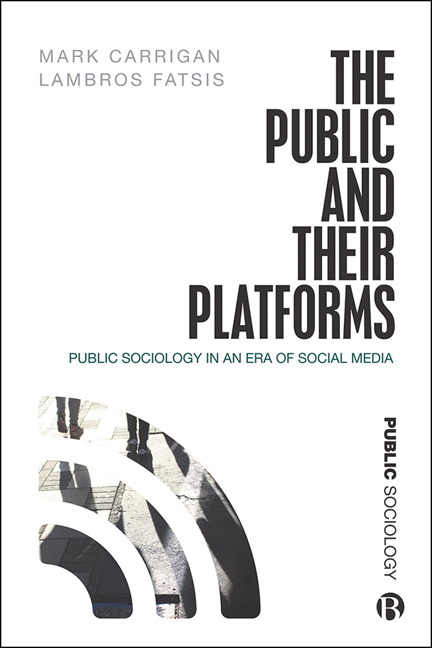Book contents
- Frontmatter
- Contents
- Acknowledgements
- Series Editors’ Preface
- Introduction
- 1 Defining ‘the Public’
- 2 The History of Platforms
- 3 Between Publics and Platforms
- 4 Sociology and its Platforms
- 5 The Past, Present and Future of Public Sociology
- 6 Making Sociology Public
- 7 Making Platforms Public
- 8 Assembling Public Sociology
- Notes
- References
- Index
8 - Assembling Public Sociology
- Frontmatter
- Contents
- Acknowledgements
- Series Editors’ Preface
- Introduction
- 1 Defining ‘the Public’
- 2 The History of Platforms
- 3 Between Publics and Platforms
- 4 Sociology and its Platforms
- 5 The Past, Present and Future of Public Sociology
- 6 Making Sociology Public
- 7 Making Platforms Public
- 8 Assembling Public Sociology
- Notes
- References
- Index
Summary
In the previous chapters we have engaged with the voluminous literature which has emerged around public sociology, suggesting it is an example of a scholastic predisposition towards thinking rather than doing. It should be stressed at the outset that we don't believe that thinking about public sociology serves no purpose. Even if we did it would be impossible, if not embarrassing, for us to admit that now that we have written an entire book on the topic. Despite this book's theoretical tone, however, its intention is actually practical. We therefore concur with David Mellor (2011) who argued that ‘[w] e don't need to debate public sociology anymore; we need to get good at it’. Stating this book's objective in such a bold and forthright manner might seem imprudent or careless even, yet much of the sentiment behind Mellor's arresting phrase captures our own argument for a sociology that can be(come) public only if it reinvents itself as such. Yet, what do sociologists need to do to make their discipline ‘public’? What does it mean to be good at public sociology? What does it mean to do it well? How would we know that we have done this? Once we start asking such questions, it becomes clear that the answers depend on how we define our terms, how we envision the practice of public sociology and what the key attributes for such a role may be.
In our view, becoming good at public sociology involves a process of weaning ourselves off our professional(ized) or institutional(ized) identity to acquire a taste for a more public or civic purpose to our scholarship. Such a shift from a professional to a scholarly identity or role for sociology and sociologists may sound vague, idealistic or unrealistic. But it is seen here as the first step towards resisting the trappings of professionalization and giving ourselves permission to (re)define what sociology is, who it is for, who we are, as well as what we do and how we do it, according to our intellectual and civic preoccupations rather than our professional occupation. To put it bluntly what we oppose is the way that ‘professionalization leads to privatization or depoliticization, a withdrawal of intellectual energy from a larger domain to a narrower discipline’ (Jacoby, 1987: 147).
- Type
- Chapter
- Information
- The Public and their PlatformsPublic Sociology in an Era of Social Media, pp. 173 - 194Publisher: Bristol University PressPrint publication year: 2021



